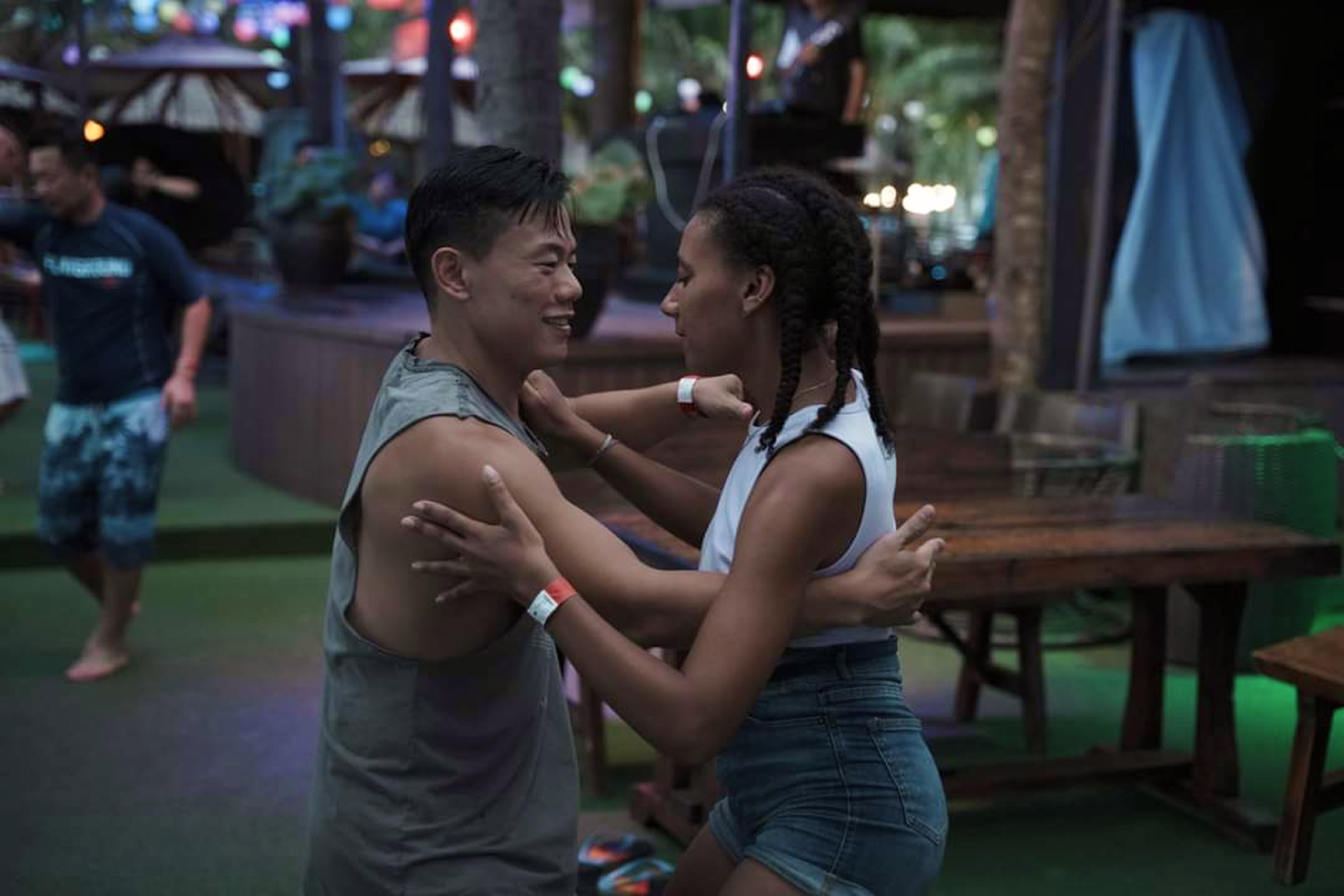Slowmading is an adventure, with Jo
Taking the time to travel slow, to sponge in a culture, to fall in love, to feel lonely, and decide to stay anyway… Adventure isn’t always adrenaline. It can also be the discovery of oneself.
Jo has this quality all introverts seem to have: she’s quiet, yet when she speaks, everyone stops to listen. She’s got lots to say about self-care, society’s expectations, and the nomad lifestyle. For her, traveling isn’t about the bucket list - it’s about staying out of her comfort zone, meeting new people, and growing.
Growing up in Singapore, she’s always wanted out of the study-work-get-married life. When she got a job as a lawyer for a remote tech company, she packed her bags and left her island.
Among all 50+ countries she’s visited, Korea is one of her favorite rest stops. The place where she finds peace before heading back to slow travel through the unknown.
Why Korea?
When I travel somewhere, there’s usually a reason for me to go there. It’s rarely just the culture. My reason for Korea is friends, family, and colleagues. My little sister lives here as well as some coworkers. It’s like a rest stop for me. I get to hang out… and refill my makeup and skincare products. (Laughs.) It’s important. I’m a big advocate of taking care of yourself.
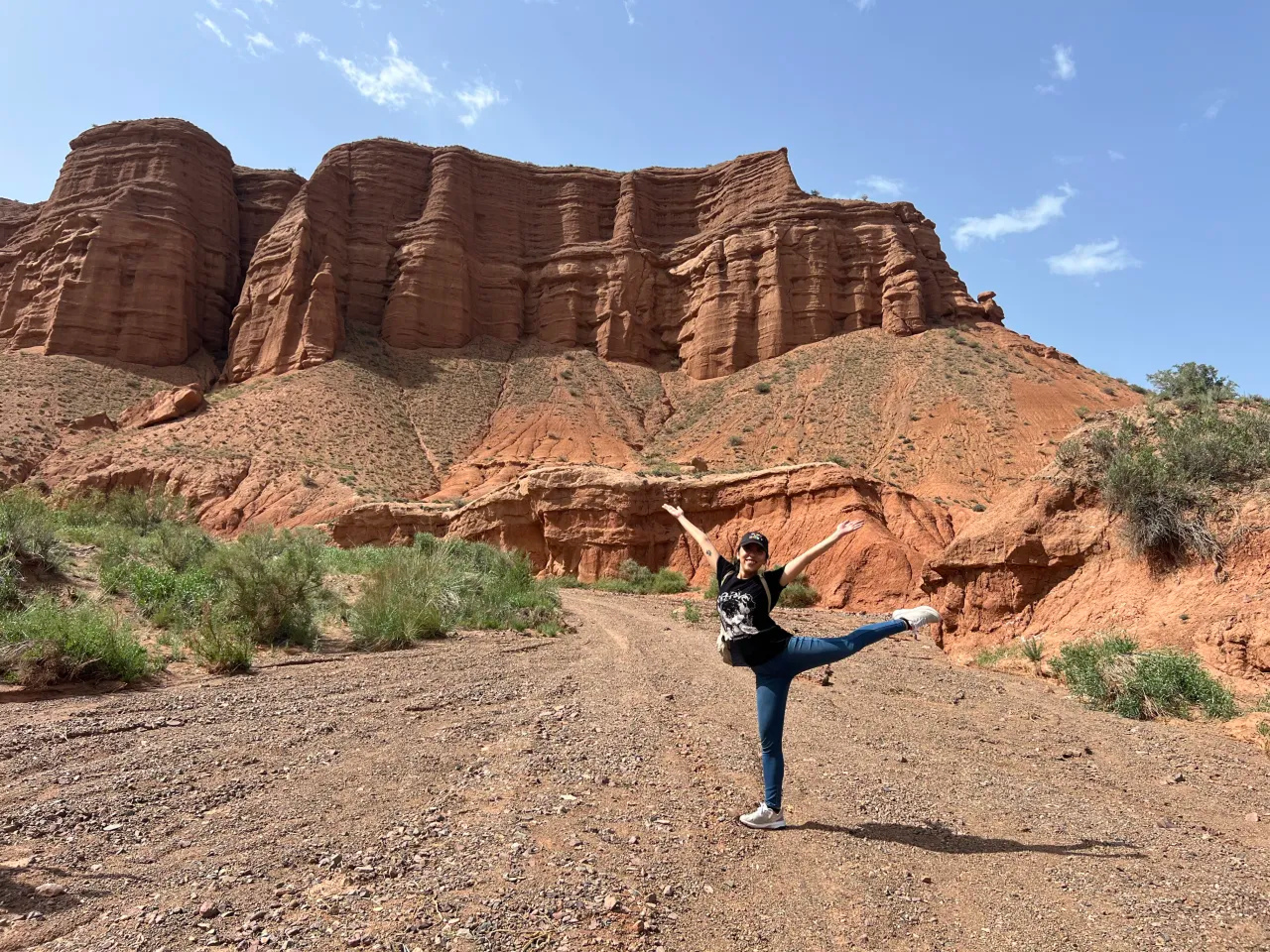
How many times have you visited?
It’s my fourth time already. I was born and raised in Singapore, so Korea’s always been a very popular destination for me. First time I came was 2004 - I must have been 8 or 9. I came back when I was 15, and the last time was two years ago. It’s been nice to see how it’s changed.
2004! Do you remember much from the trip?
I remember bits and pieces. Food was good as ever. I had ginseng chicken soup (samgyetang) and kimbap. We made kimchi, and we also went skiing at Phoenix Park - it’s one of the resorts in Pyeongchang.
I’m not hearing ‘skincare’ yet…
That was the second trip! (Laughs.) I was a teenager, so I spent a lot of my time being amazed by the sheer number of products available. I was awed by the nail polishes and lip glosses. I could also be more independent, and I have great memories of going around on my own while my parents waited in a cafe.
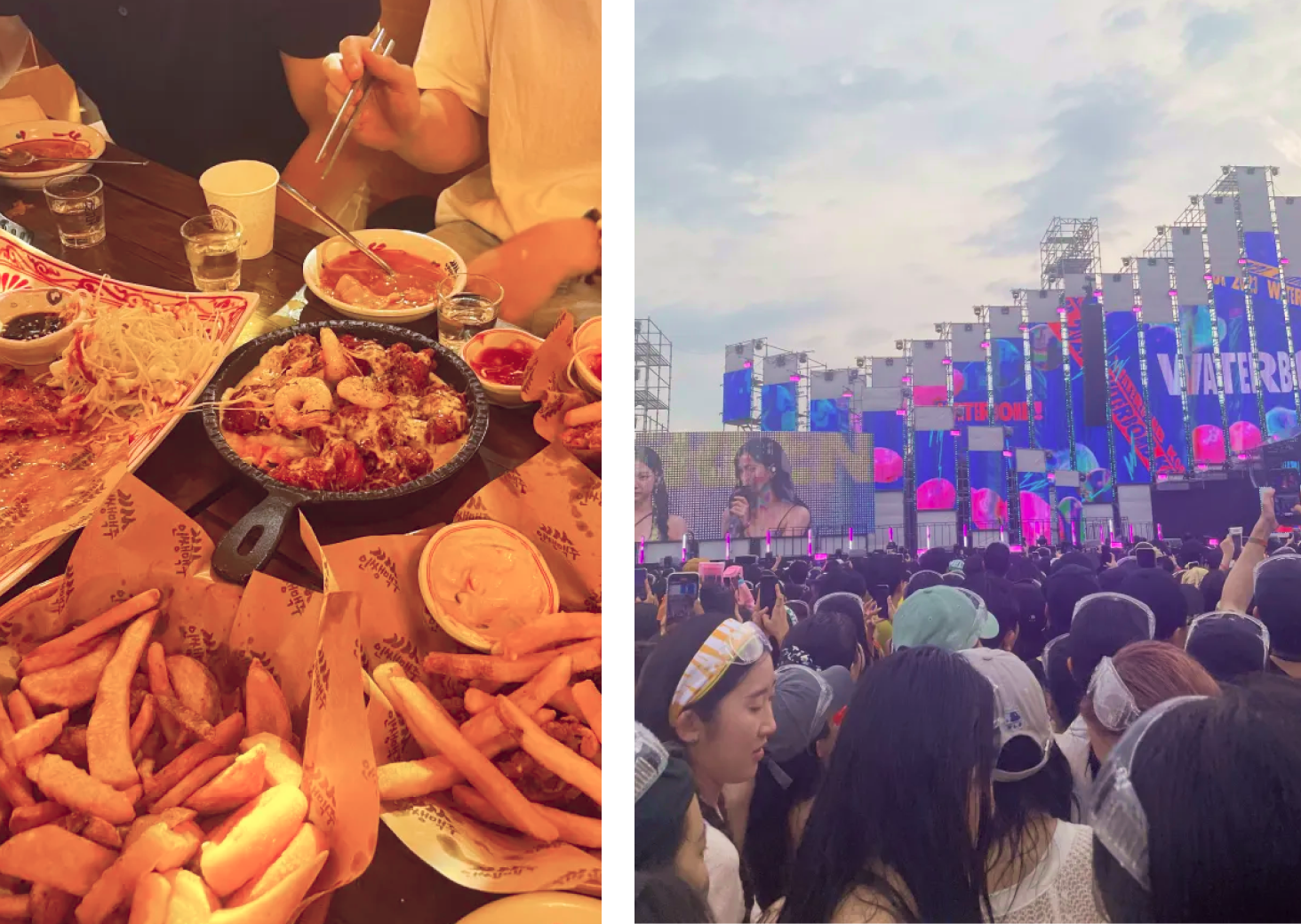
That was more than twelve years ago…
That’s why coming back two years ago in the summer was a completely different experience. I was working a stable job, and I could enjoy Korea to the fullest - it’s not the cheapest place to travel in Asia. I met many new people while partying in Hongdae, Itaewon, and other bars. I also went to the Waterbomb festival.
And now?
This time I’m here to chill and see family and colleagues. I was in Central Asia before this. I was enjoying myself, but it was slightly challenging for various reasons... Korea has really felt like a familiar rest stop. I’ve not gone out in Itaewon a single night.
Have you retired from partying? (Laughs.)
(Laughs.) In the past, I liked partying, but now I do it once every two months. Whenever someone guilt-trips me.
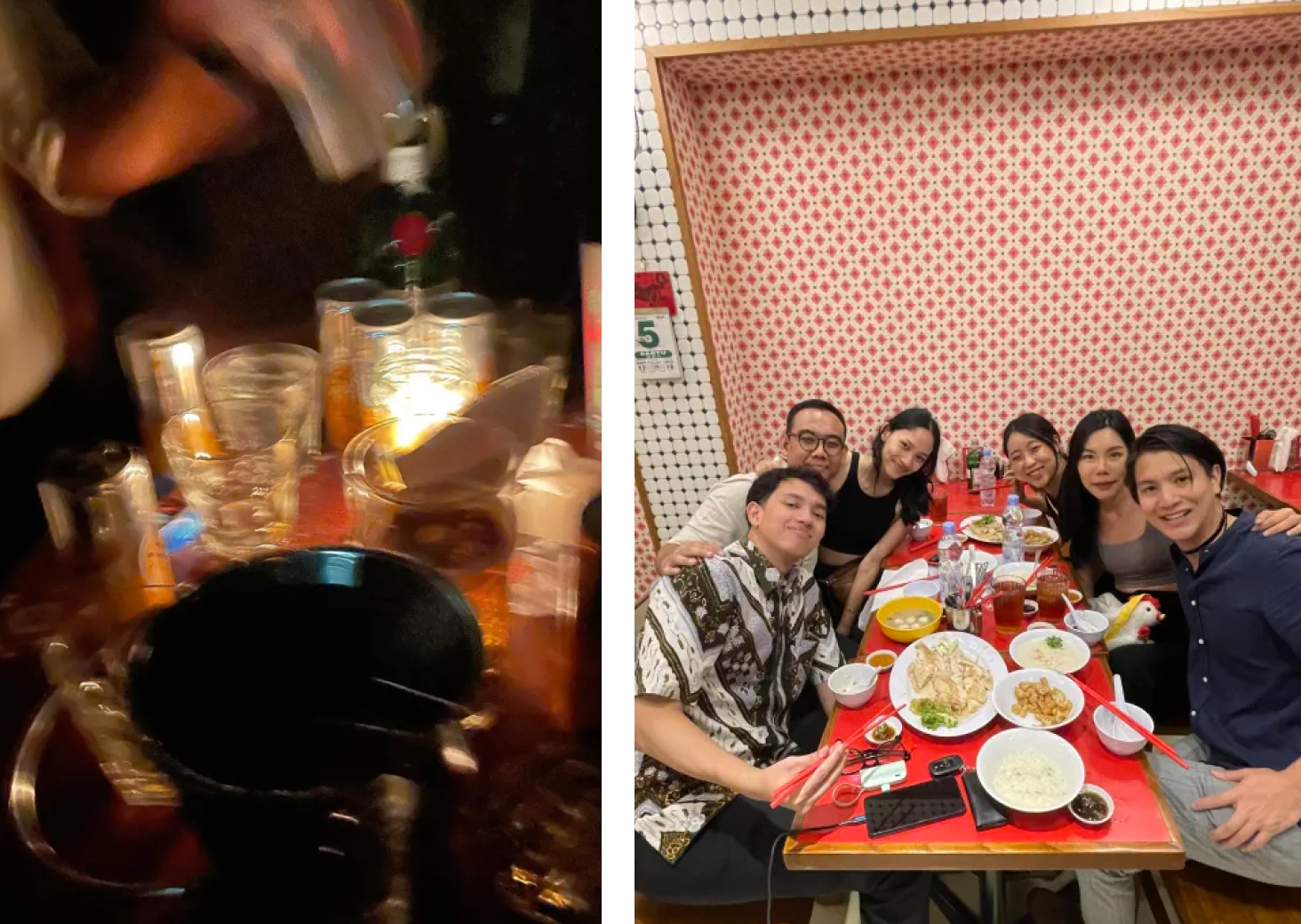
How did you become a digital nomad?
Becoming a remote worker wasn’t planned. You don’t see many remote lawyers, because where we get to go and where you’ll find us is pretty much tied to where we’re licensed. But I saw a job opening for a global tech company and went for it. I interviewed, and the rest is history. I started working there last year, in January.
What’s your job like?
It’s a mix between being a project manager, a researcher, and… a janitor! I review contracts, research global financial rules to make sure we don’t get fined or, you know, go to jail. (Laughs.) I also help with operational organising, so that everything is filed and kept. I interviewed while I was travelling, and the whole company structure works remotely. I didn’t dream of nomading, but I did dream of leaving Singapore. So I thought: let’s do it!
Why did you dream of leaving Singapore?
Singapore is a really small country, and within it, there’s only one way to live a well-lived life. Society expects you to go to school, get accepted into a university, start to work, get married, have a kid, maybe adopt a dog or a cat, switch companies once every couple of years for a higher salary, and work some more, until you die. The nomadic life isn’t part of it. That’s what I love about traveling: I’ve had the chance to grow. I get to see how people live in different places around the world.
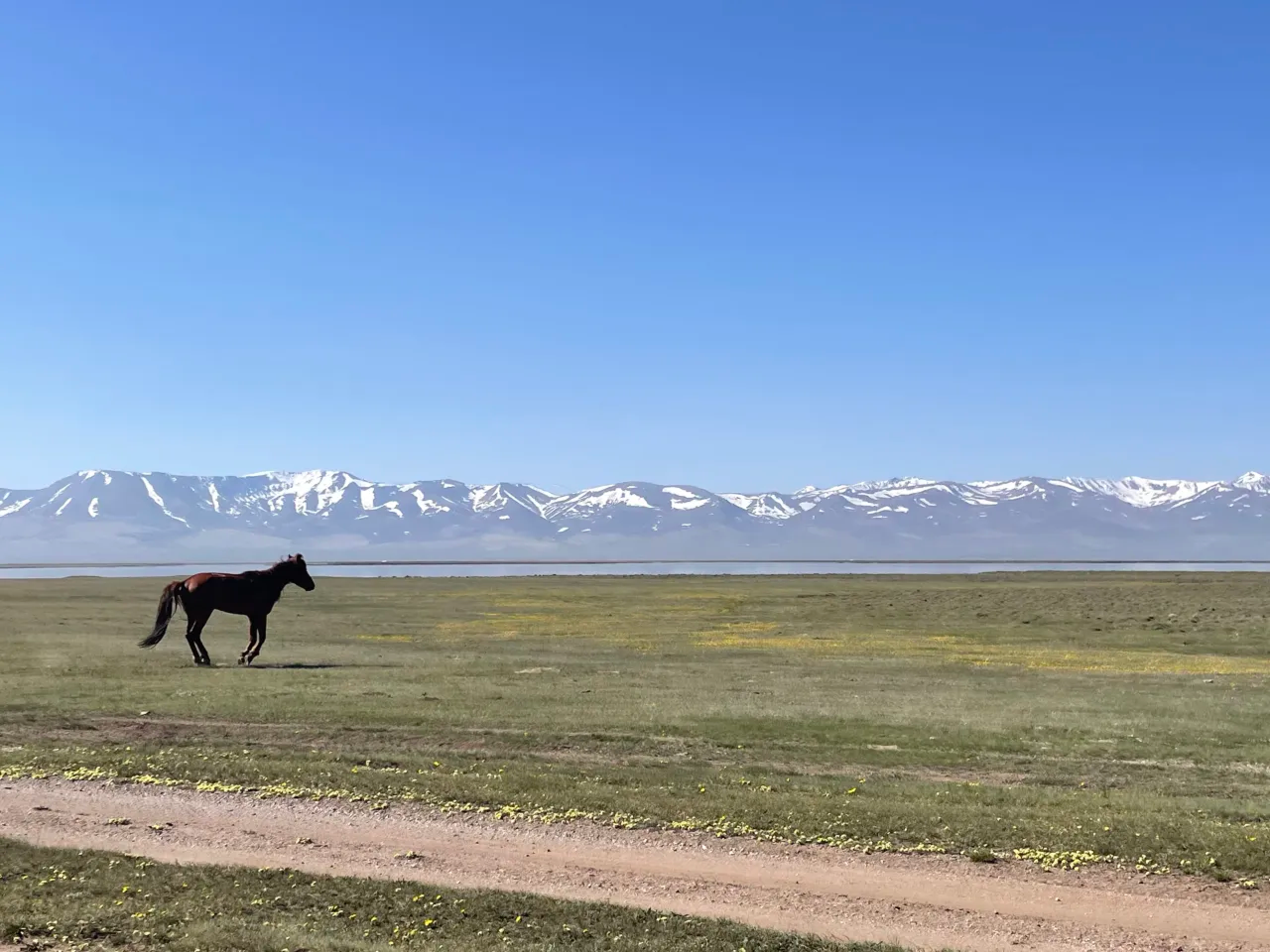
What’s your favorite place?
Maybe Bangkok? It was kind of my base last year. I know there’s this romantic idea of traveling the world with only your suitcase, but it was nice to have a space to call my own, where I could form deeper friendships. It’s ironic. I travel to get out of my comfort zone… to then end up building a sense of safety and comfort where I travel (laughs).
What about somewhere that challenged that sense of comfort?
Kyrgyzstan. Working remotely was so different there. In Southeast and East Asia, being a digital nomad is a thing. There are communities, places around the whole concept. Cities even. In Kyrgyzstan, not so much. No one comes to you saying, ‘I’m a digital nomad’. It’s just ‘Yeah. I work remotely. I’m a dev’.
In what way was Kyrgyzstan different from your other experiences?
The first thing I noticed was: no one smiles. If you smile, people will wonder why you do it, what you want from them. At least in the capital, Bishkek. It was hard to get used to that. I also found it difficult to connect with people and work remotely, because there are just fewer people doing that. I don’t speak Russian or Kyrgyz, beyond saying hello, goodbye, and thank you. And in Russian, the most I can do is read the menu. Being there… I was really on the road on my own. I might have cried some nights. (Laughs.)
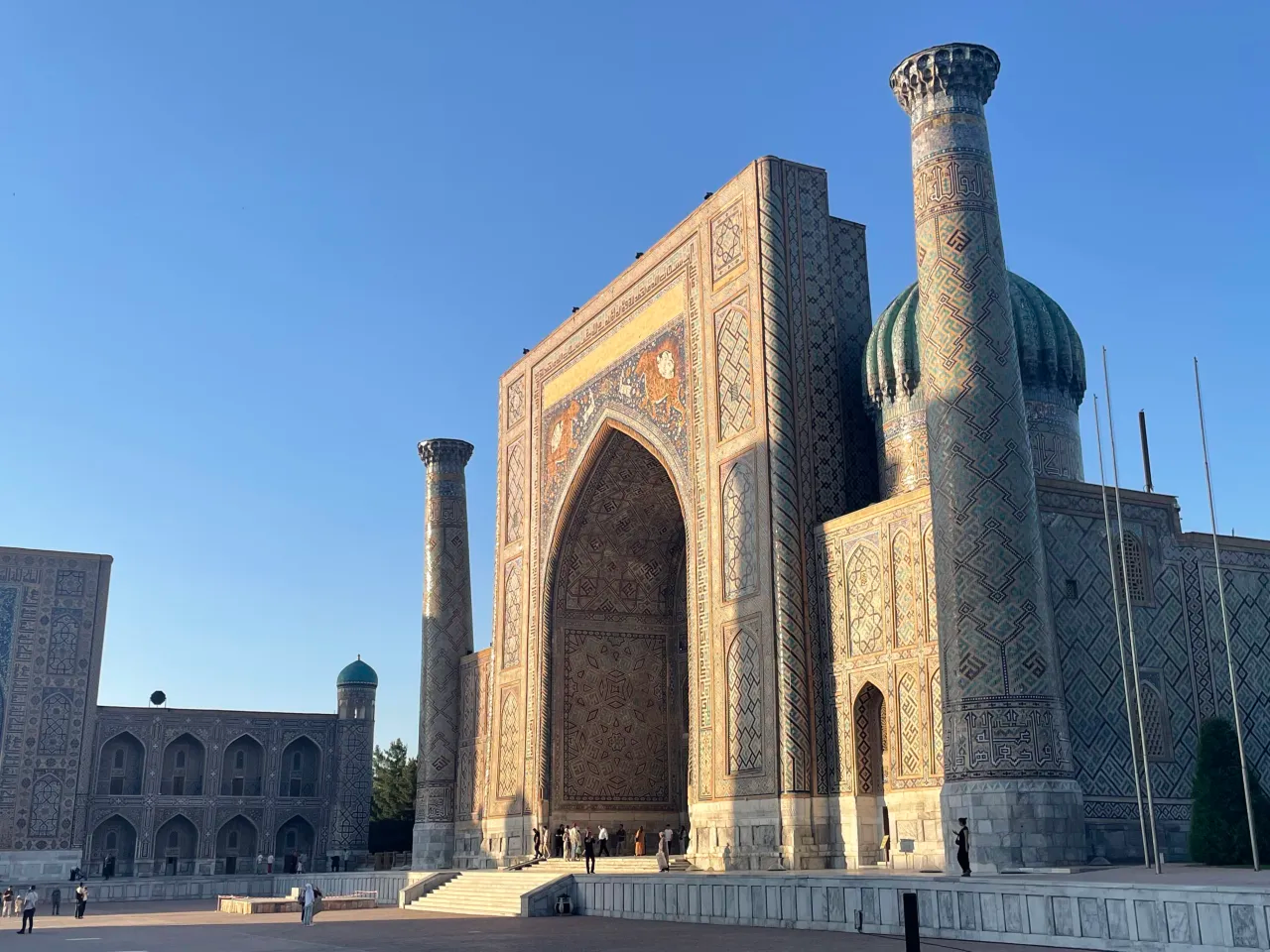
Sounds lonely…
But that’s exactly why I do this. I want to feel a sense of adventure and growth! I think that’s why those two places had the strongest impact on me. Bangkok is where I found the people I call friends, and Bishkek is where I found how much loneliness I can endure. I’m excited for the next trip that hits me as hard.
How do you usually deal with loneliness?
Actually, my approach to this has changed quite a lot. At first, I went for Airbnbs because it was incredible to have all that space! It’s not something you find a lot in Singapore (laughs). But it was a bit difficult to meet people, so I started booking hostels and homestays. This trip to Korea is my first time staying at a coliving like Hoppin House.
First time? No way, there are so many coliving spaces in Southeast Asia.
I never felt like going to one until recently, somehow. I’ve always traveled to where I had my friends and family. I met people at work events or coworking spaces. Maybe it was Kyrgyzstan, but I’ve been starting to feel like I should meet other remote workers and nomads. I think I have plenty to learn from them as well. That’s why I picked a Coliving space this time.
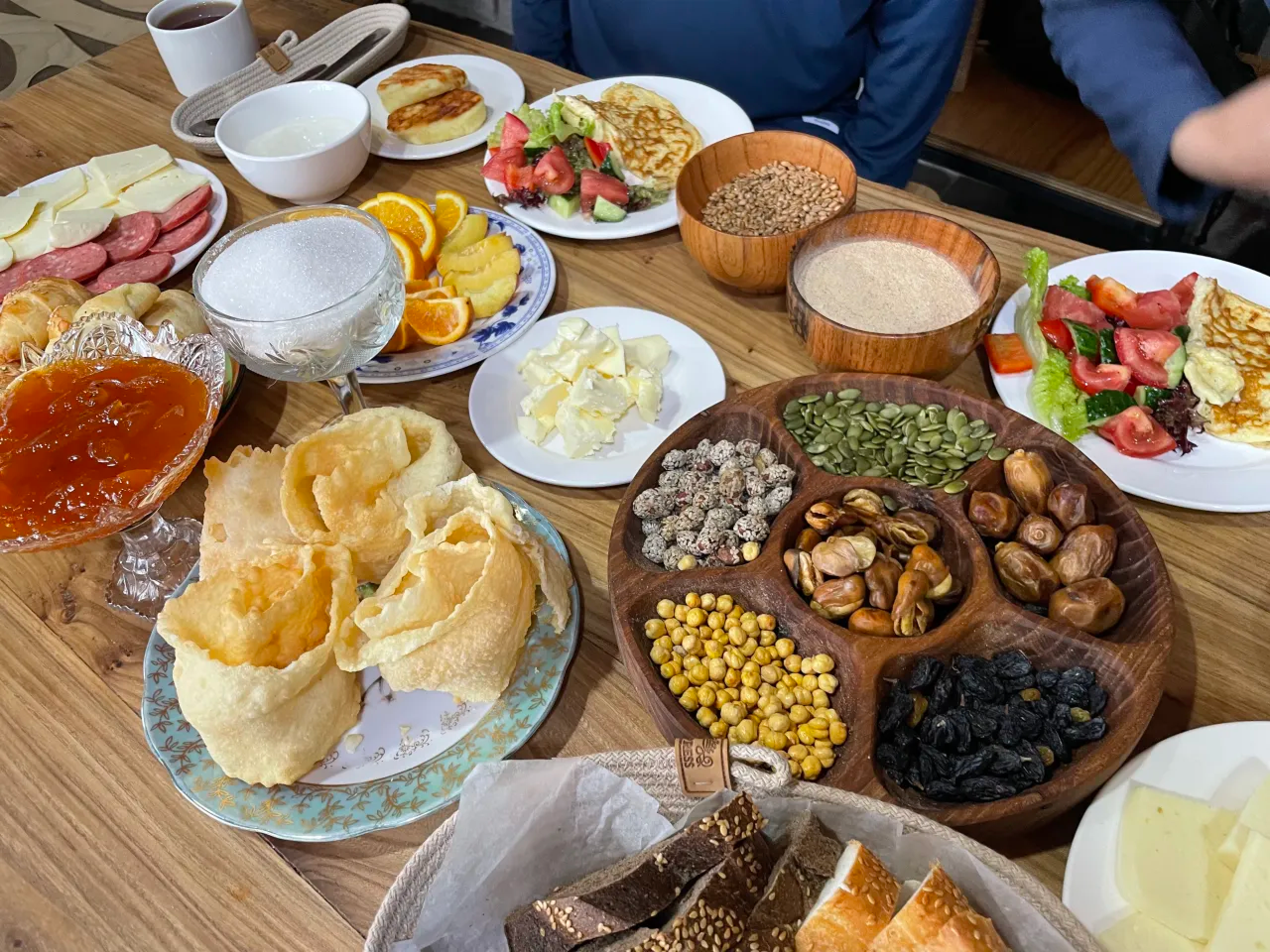
Did it change your mind on coliving?
I’m a quiet introvert. When I thought of a coliving space, I thought, ‘What if someone walks around? Maybe I want to walk around in my underwear!’. (Laughs.) But I’m starting to realise it’s nice to have people around you, even just in the background. There’s a sense of comfort in that as well.
Why did you pick Hoppin House?
There’s a big kitchen and I cook a lot. I love that the coworking space is downstairs from the coliving. I can just roll out of bed and get to work. (Laughs.) It’s cozy because it’s an actual house. It doesn’t feel like cold, like a franchise. People are friendly, but don’t pressure you, which is a great balance. You have your space if you want it, and you can go for dinner together.
You’re coming back soon, right?
Yes, I will be in Seoul in September and October because of a big conference in my industry. I’ll be joining the Hoppin Busan 2025 Workation - the Asia Excursion themed weeks. I don’t know what to expect, but I want to keep getting to know other nomads, in addition to hanging out with people I already know. I’ve also never visited Busan, somehow! I’m excited.
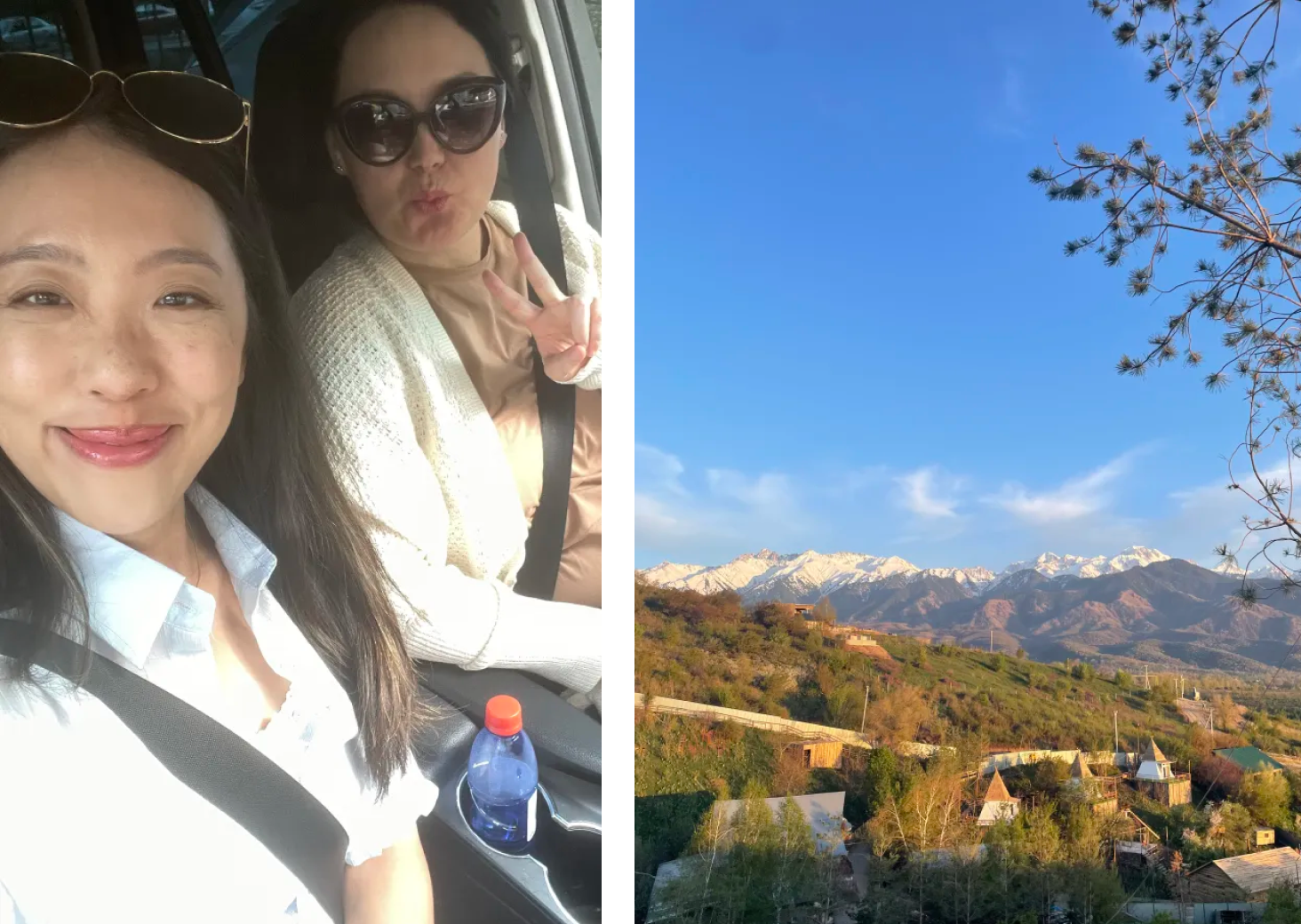
What do you miss about Korea when you’re gone?
The food. In Singapore, we only have the dishes everyone knows: Korean BBQ, sundubu jiggae, kimchi jiggae, bibimbap... But if you want post-meal fried rice (boggeumbap) or pollack roe soup (altang), you gotta be in Korea.
You said you don’t care much for minimalism when packing. What are the things you’ll never travel without?
I used to carry seven notebooks and five books with me. At some point, I was like ‘Ok, you can’t take everything with you’. Some of my stuff is in storage in Bangkok now. I still have two notebooks for work, one journal, and I recently bought one more notebook. It’s a disease (laughs). I also have my Kindle and two physical books.
Books are so amazing, but they’re so heavy… (Laughs.)
Well, I don’t really subscribe to minimalism, but I do think being a nomad forces you to be more thoughtful of the things you own. Notebooks are my thing. When I write things down, I process my thoughts. I like touching paper also. (Laughs.) It’s just the nicest feeling. So I figured, I’ll just travel the way that makes me happy. Everyone should do that.
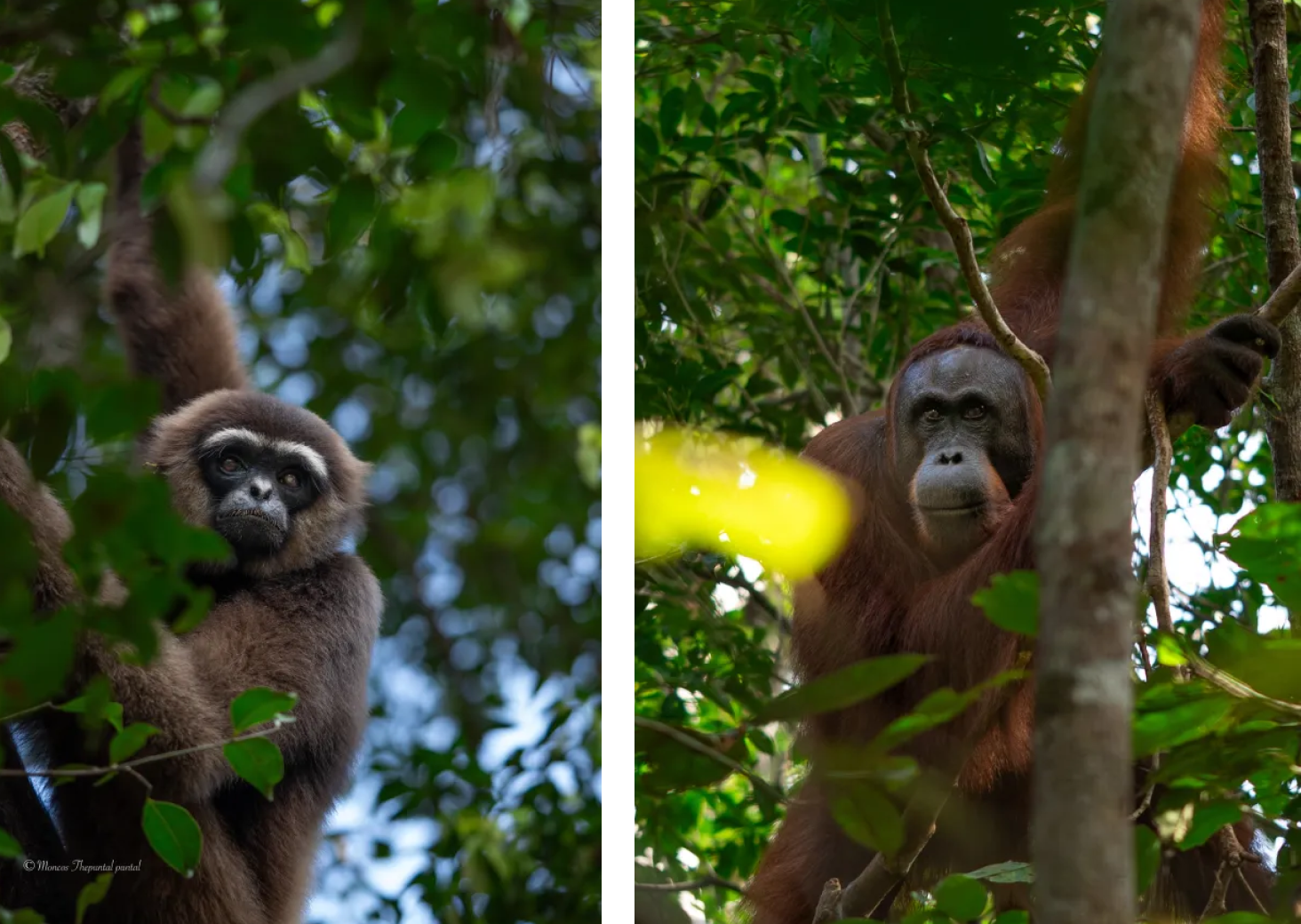
Jo’s Recommendations
📺 Something to watch
The Sympathizer, a TV show by Korean cinema legend Park Chan-wook. It’s adapted from a Vietnamese novel with the same name, and I love the story it tells, post-Vietnam War. If you had to go for one of his movies, I’d say go for Old Boy. It’s a classic.
🎶 Something to listen to
Armageddon by K-pop girl group AESPA. Their music feels so futuristic - they have metallic sounds. Armageddon was their first full-length album, and it’s a good introduction to everything they do. You should also check out their videos. They’re so high production value, there’s so much symbolism, and they’re fun.
🥘 Somewhere to eat
Refine Garosugil is a very cool restaurant with a few branches all over Seoul. Their concept is to make Korean-typical dishes with a modern twist on the plating. Seafood pancakes will have the traditional taste, but be chopped up and presented very differently from what you would expect. Plus, their selection of makgeolli (rice wine) and wine is massive and not too expensive.
Slowmading is an adventure, with Jo
Taking the time to travel slow, to sponge in a culture, to fall in love, to feel lonely, and decide to stay anyway… Adventure isn’t always adrenaline. It can also be the discovery of oneself.
Jo has this quality all introverts seem to have: she’s quiet, yet when she speaks, everyone stops to listen. She’s got lots to say about self-care, society’s expectations, and the nomad lifestyle. For her, traveling isn’t about the bucket list - it’s about staying out of her comfort zone, meeting new people, and growing.
Growing up in Singapore, she’s always wanted out of the study-work-get-married life. When she got a job as a lawyer for a remote tech company, she packed her bags and left her island.
Among all 50+ countries she’s visited, Korea is one of her favorite rest stops. The place where she finds peace before heading back to slow travel through the unknown.
Why Korea?
When I travel somewhere, there’s usually a reason for me to go there. It’s rarely just the culture. My reason for Korea is friends, family, and colleagues. My little sister lives here as well as some coworkers. It’s like a rest stop for me. I get to hang out… and refill my makeup and skincare products. (Laughs.) It’s important. I’m a big advocate of taking care of yourself.

How many times have you visited?
It’s my fourth time already. I was born and raised in Singapore, so Korea’s always been a very popular destination for me. First time I came was 2004 - I must have been 8 or 9. I came back when I was 15, and the last time was two years ago. It’s been nice to see how it’s changed.
2004! Do you remember much from the trip?
I remember bits and pieces. Food was good as ever. I had ginseng chicken soup (samgyetang) and kimbap. We made kimchi, and we also went skiing at Phoenix Park - it’s one of the resorts in Pyeongchang.
I’m not hearing ‘skincare’ yet…
That was the second trip! (Laughs.) I was a teenager, so I spent a lot of my time being amazed by the sheer number of products available. I was awed by the nail polishes and lip glosses. I could also be more independent, and I have great memories of going around on my own while my parents waited in a cafe.

That was more than twelve years ago…
That’s why coming back two years ago in the summer was a completely different experience. I was working a stable job, and I could enjoy Korea to the fullest - it’s not the cheapest place to travel in Asia. I met many new people while partying in Hongdae, Itaewon, and other bars. I also went to the Waterbomb festival.
And now?
This time I’m here to chill and see family and colleagues. I was in Central Asia before this. I was enjoying myself, but it was slightly challenging for various reasons... Korea has really felt like a familiar rest stop. I’ve not gone out in Itaewon a single night.
Have you retired from partying? (Laughs.)
(Laughs.) In the past, I liked partying, but now I do it once every two months. Whenever someone guilt-trips me.

How did you become a digital nomad?
Becoming a remote worker wasn’t planned. You don’t see many remote lawyers, because where we get to go and where you’ll find us is pretty much tied to where we’re licensed. But I saw a job opening for a global tech company and went for it. I interviewed, and the rest is history. I started working there last year, in January.
What’s your job like?
It’s a mix between being a project manager, a researcher, and… a janitor! I review contracts, research global financial rules to make sure we don’t get fined or, you know, go to jail. (Laughs.) I also help with operational organising, so that everything is filed and kept. I interviewed while I was travelling, and the whole company structure works remotely. I didn’t dream of nomading, but I did dream of leaving Singapore. So I thought: let’s do it!
Why did you dream of leaving Singapore?
Singapore is a really small country, and within it, there’s only one way to live a well-lived life. Society expects you to go to school, get accepted into a university, start to work, get married, have a kid, maybe adopt a dog or a cat, switch companies once every couple of years for a higher salary, and work some more, until you die. The nomadic life isn’t part of it. That’s what I love about traveling: I’ve had the chance to grow. I get to see how people live in different places around the world.

What’s your favorite place?
Maybe Bangkok? It was kind of my base last year. I know there’s this romantic idea of traveling the world with only your suitcase, but it was nice to have a space to call my own, where I could form deeper friendships. It’s ironic. I travel to get out of my comfort zone… to then end up building a sense of safety and comfort where I travel (laughs).
What about somewhere that challenged that sense of comfort?
Kyrgyzstan. Working remotely was so different there. In Southeast and East Asia, being a digital nomad is a thing. There are communities, places around the whole concept. Cities even. In Kyrgyzstan, not so much. No one comes to you saying, ‘I’m a digital nomad’. It’s just ‘Yeah. I work remotely. I’m a dev’.
In what way was Kyrgyzstan different from your other experiences?
The first thing I noticed was: no one smiles. If you smile, people will wonder why you do it, what you want from them. At least in the capital, Bishkek. It was hard to get used to that. I also found it difficult to connect with people and work remotely, because there are just fewer people doing that. I don’t speak Russian or Kyrgyz, beyond saying hello, goodbye, and thank you. And in Russian, the most I can do is read the menu. Being there… I was really on the road on my own. I might have cried some nights. (Laughs.)

Sounds lonely…
But that’s exactly why I do this. I want to feel a sense of adventure and growth! I think that’s why those two places had the strongest impact on me. Bangkok is where I found the people I call friends, and Bishkek is where I found how much loneliness I can endure. I’m excited for the next trip that hits me as hard.
How do you usually deal with loneliness?
Actually, my approach to this has changed quite a lot. At first, I went for Airbnbs because it was incredible to have all that space! It’s not something you find a lot in Singapore (laughs). But it was a bit difficult to meet people, so I started booking hostels and homestays. This trip to Korea is my first time staying at a coliving like Hoppin House.
First time? No way, there are so many coliving spaces in Southeast Asia.
I never felt like going to one until recently, somehow. I’ve always traveled to where I had my friends and family. I met people at work events or coworking spaces. Maybe it was Kyrgyzstan, but I’ve been starting to feel like I should meet other remote workers and nomads. I think I have plenty to learn from them as well. That’s why I picked a Coliving space this time.

Did it change your mind on coliving?
I’m a quiet introvert. When I thought of a coliving space, I thought, ‘What if someone walks around? Maybe I want to walk around in my underwear!’. (Laughs.) But I’m starting to realise it’s nice to have people around you, even just in the background. There’s a sense of comfort in that as well.
Why did you pick Hoppin House?
There’s a big kitchen and I cook a lot. I love that the coworking space is downstairs from the coliving. I can just roll out of bed and get to work. (Laughs.) It’s cozy because it’s an actual house. It doesn’t feel like cold, like a franchise. People are friendly, but don’t pressure you, which is a great balance. You have your space if you want it, and you can go for dinner together.
You’re coming back soon, right?
Yes, I will be in Seoul in September and October because of a big conference in my industry. I’ll be joining the Hoppin Busan 2025 Workation - the Asia Excursion themed weeks. I don’t know what to expect, but I want to keep getting to know other nomads, in addition to hanging out with people I already know. I’ve also never visited Busan, somehow! I’m excited.

What do you miss about Korea when you’re gone?
The food. In Singapore, we only have the dishes everyone knows: Korean BBQ, sundubu jiggae, kimchi jiggae, bibimbap... But if you want post-meal fried rice (boggeumbap) or pollack roe soup (altang), you gotta be in Korea.
You said you don’t care much for minimalism when packing. What are the things you’ll never travel without?
I used to carry seven notebooks and five books with me. At some point, I was like ‘Ok, you can’t take everything with you’. Some of my stuff is in storage in Bangkok now. I still have two notebooks for work, one journal, and I recently bought one more notebook. It’s a disease (laughs). I also have my Kindle and two physical books.
Books are so amazing, but they’re so heavy… (Laughs.)
Well, I don’t really subscribe to minimalism, but I do think being a nomad forces you to be more thoughtful of the things you own. Notebooks are my thing. When I write things down, I process my thoughts. I like touching paper also. (Laughs.) It’s just the nicest feeling. So I figured, I’ll just travel the way that makes me happy. Everyone should do that.

Jo’s Recommendations
📺 Something to watch
The Sympathizer, a TV show by Korean cinema legend Park Chan-wook. It’s adapted from a Vietnamese novel with the same name, and I love the story it tells, post-Vietnam War. If you had to go for one of his movies, I’d say go for Old Boy. It’s a classic.
🎶 Something to listen to
Armageddon by K-pop girl group AESPA. Their music feels so futuristic - they have metallic sounds. Armageddon was their first full-length album, and it’s a good introduction to everything they do. You should also check out their videos. They’re so high production value, there’s so much symbolism, and they’re fun.
🥘 Somewhere to eat
Refine Garosugil is a very cool restaurant with a few branches all over Seoul. Their concept is to make Korean-typical dishes with a modern twist on the plating. Seafood pancakes will have the traditional taste, but be chopped up and presented very differently from what you would expect. Plus, their selection of makgeolli (rice wine) and wine is massive and not too expensive.
Slowmading is an adventure, with Jo
Taking the time to travel slow, to sponge in a culture, to fall in love, to feel lonely, and decide to stay anyway… Adventure isn’t always adrenaline. It can also be the discovery of oneself.
Jo has this quality all introverts seem to have: she’s quiet, yet when she speaks, everyone stops to listen. She’s got lots to say about self-care, society’s expectations, and the nomad lifestyle. For her, traveling isn’t about the bucket list - it’s about staying out of her comfort zone, meeting new people, and growing.
Growing up in Singapore, she’s always wanted out of the study-work-get-married life. When she got a job as a lawyer for a remote tech company, she packed her bags and left her island.
Among all 50+ countries she’s visited, Korea is one of her favorite rest stops. The place where she finds peace before heading back to slow travel through the unknown.
Why Korea?
When I travel somewhere, there’s usually a reason for me to go there. It’s rarely just the culture. My reason for Korea is friends, family, and colleagues. My little sister lives here as well as some coworkers. It’s like a rest stop for me. I get to hang out… and refill my makeup and skincare products. (Laughs.) It’s important. I’m a big advocate of taking care of yourself.

How many times have you visited?
It’s my fourth time already. I was born and raised in Singapore, so Korea’s always been a very popular destination for me. First time I came was 2004 - I must have been 8 or 9. I came back when I was 15, and the last time was two years ago. It’s been nice to see how it’s changed.
2004! Do you remember much from the trip?
I remember bits and pieces. Food was good as ever. I had ginseng chicken soup (samgyetang) and kimbap. We made kimchi, and we also went skiing at Phoenix Park - it’s one of the resorts in Pyeongchang.
I’m not hearing ‘skincare’ yet…
That was the second trip! (Laughs.) I was a teenager, so I spent a lot of my time being amazed by the sheer number of products available. I was awed by the nail polishes and lip glosses. I could also be more independent, and I have great memories of going around on my own while my parents waited in a cafe.

That was more than twelve years ago…
That’s why coming back two years ago in the summer was a completely different experience. I was working a stable job, and I could enjoy Korea to the fullest - it’s not the cheapest place to travel in Asia. I met many new people while partying in Hongdae, Itaewon, and other bars. I also went to the Waterbomb festival.
And now?
This time I’m here to chill and see family and colleagues. I was in Central Asia before this. I was enjoying myself, but it was slightly challenging for various reasons... Korea has really felt like a familiar rest stop. I’ve not gone out in Itaewon a single night.
Have you retired from partying? (Laughs.)
(Laughs.) In the past, I liked partying, but now I do it once every two months. Whenever someone guilt-trips me.

How did you become a digital nomad?
Becoming a remote worker wasn’t planned. You don’t see many remote lawyers, because where we get to go and where you’ll find us is pretty much tied to where we’re licensed. But I saw a job opening for a global tech company and went for it. I interviewed, and the rest is history. I started working there last year, in January.
What’s your job like?
It’s a mix between being a project manager, a researcher, and… a janitor! I review contracts, research global financial rules to make sure we don’t get fined or, you know, go to jail. (Laughs.) I also help with operational organising, so that everything is filed and kept. I interviewed while I was travelling, and the whole company structure works remotely. I didn’t dream of nomading, but I did dream of leaving Singapore. So I thought: let’s do it!
Why did you dream of leaving Singapore?
Singapore is a really small country, and within it, there’s only one way to live a well-lived life. Society expects you to go to school, get accepted into a university, start to work, get married, have a kid, maybe adopt a dog or a cat, switch companies once every couple of years for a higher salary, and work some more, until you die. The nomadic life isn’t part of it. That’s what I love about traveling: I’ve had the chance to grow. I get to see how people live in different places around the world.

What’s your favorite place?
Maybe Bangkok? It was kind of my base last year. I know there’s this romantic idea of traveling the world with only your suitcase, but it was nice to have a space to call my own, where I could form deeper friendships. It’s ironic. I travel to get out of my comfort zone… to then end up building a sense of safety and comfort where I travel (laughs).
What about somewhere that challenged that sense of comfort?
Kyrgyzstan. Working remotely was so different there. In Southeast and East Asia, being a digital nomad is a thing. There are communities, places around the whole concept. Cities even. In Kyrgyzstan, not so much. No one comes to you saying, ‘I’m a digital nomad’. It’s just ‘Yeah. I work remotely. I’m a dev’.
In what way was Kyrgyzstan different from your other experiences?
The first thing I noticed was: no one smiles. If you smile, people will wonder why you do it, what you want from them. At least in the capital, Bishkek. It was hard to get used to that. I also found it difficult to connect with people and work remotely, because there are just fewer people doing that. I don’t speak Russian or Kyrgyz, beyond saying hello, goodbye, and thank you. And in Russian, the most I can do is read the menu. Being there… I was really on the road on my own. I might have cried some nights. (Laughs.)

Sounds lonely…
But that’s exactly why I do this. I want to feel a sense of adventure and growth! I think that’s why those two places had the strongest impact on me. Bangkok is where I found the people I call friends, and Bishkek is where I found how much loneliness I can endure. I’m excited for the next trip that hits me as hard.
How do you usually deal with loneliness?
Actually, my approach to this has changed quite a lot. At first, I went for Airbnbs because it was incredible to have all that space! It’s not something you find a lot in Singapore (laughs). But it was a bit difficult to meet people, so I started booking hostels and homestays. This trip to Korea is my first time staying at a coliving like Hoppin House.
First time? No way, there are so many coliving spaces in Southeast Asia.
I never felt like going to one until recently, somehow. I’ve always traveled to where I had my friends and family. I met people at work events or coworking spaces. Maybe it was Kyrgyzstan, but I’ve been starting to feel like I should meet other remote workers and nomads. I think I have plenty to learn from them as well. That’s why I picked a Coliving space this time.

Did it change your mind on coliving?
I’m a quiet introvert. When I thought of a coliving space, I thought, ‘What if someone walks around? Maybe I want to walk around in my underwear!’. (Laughs.) But I’m starting to realise it’s nice to have people around you, even just in the background. There’s a sense of comfort in that as well.
Why did you pick Hoppin House?
There’s a big kitchen and I cook a lot. I love that the coworking space is downstairs from the coliving. I can just roll out of bed and get to work. (Laughs.) It’s cozy because it’s an actual house. It doesn’t feel like cold, like a franchise. People are friendly, but don’t pressure you, which is a great balance. You have your space if you want it, and you can go for dinner together.
You’re coming back soon, right?
Yes, I will be in Seoul in September and October because of a big conference in my industry. I’ll be joining the Hoppin Busan 2025 Workation - the Asia Excursion themed weeks. I don’t know what to expect, but I want to keep getting to know other nomads, in addition to hanging out with people I already know. I’ve also never visited Busan, somehow! I’m excited.

What do you miss about Korea when you’re gone?
The food. In Singapore, we only have the dishes everyone knows: Korean BBQ, sundubu jiggae, kimchi jiggae, bibimbap... But if you want post-meal fried rice (boggeumbap) or pollack roe soup (altang), you gotta be in Korea.
You said you don’t care much for minimalism when packing. What are the things you’ll never travel without?
I used to carry seven notebooks and five books with me. At some point, I was like ‘Ok, you can’t take everything with you’. Some of my stuff is in storage in Bangkok now. I still have two notebooks for work, one journal, and I recently bought one more notebook. It’s a disease (laughs). I also have my Kindle and two physical books.
Books are so amazing, but they’re so heavy… (Laughs.)
Well, I don’t really subscribe to minimalism, but I do think being a nomad forces you to be more thoughtful of the things you own. Notebooks are my thing. When I write things down, I process my thoughts. I like touching paper also. (Laughs.) It’s just the nicest feeling. So I figured, I’ll just travel the way that makes me happy. Everyone should do that.

Jo’s Recommendations
📺 Something to watch
The Sympathizer, a TV show by Korean cinema legend Park Chan-wook. It’s adapted from a Vietnamese novel with the same name, and I love the story it tells, post-Vietnam War. If you had to go for one of his movies, I’d say go for Old Boy. It’s a classic.
🎶 Something to listen to
Armageddon by K-pop girl group AESPA. Their music feels so futuristic - they have metallic sounds. Armageddon was their first full-length album, and it’s a good introduction to everything they do. You should also check out their videos. They’re so high production value, there’s so much symbolism, and they’re fun.
🥘 Somewhere to eat
Refine Garosugil is a very cool restaurant with a few branches all over Seoul. Their concept is to make Korean-typical dishes with a modern twist on the plating. Seafood pancakes will have the traditional taste, but be chopped up and presented very differently from what you would expect. Plus, their selection of makgeolli (rice wine) and wine is massive and not too expensive.

.png)
